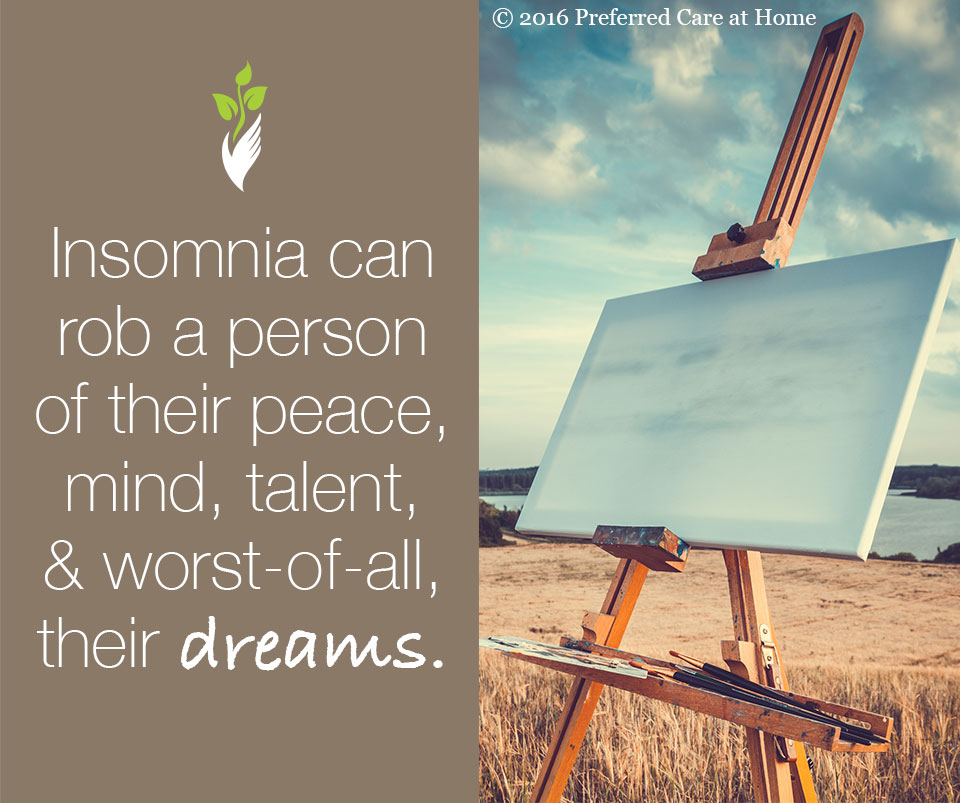Insomnia: When You Can’t Gogh to Sleep
Published October 21, 2016 by Ashly Luckose, Esq. in Senior Health & Wellness

His paintings, of farmhands, sunflowers, and starry nights, can easily be described as scenes from a dream, where ordinary subjects often take on a quality that’s colorfully supernatural and otherworldly.
So given his skill to create these dreamscapes, it should be surprising to learn that Vincent Van Gogh suffered greatly from insomnia. (for those unfamiliar with the condition, insomnia is described by the Mayo Clinic as “a common sleep disorder that can make it hard to fall asleep, hard to stay asleep, or cause you to wake up too early and not be able to get back to sleep.)
In the letters Van Gogh would write to his brother Theo, he would often talk about his insomnia resulting in sleepless nights and dreary, lethargic mornings; and how it was taking a toll on his art.
“It is already late. I have not slept well these last few nights. It is all that beautiful autumn scenery that I have on my mind, and the desire to profit by it. But I wish I could sleep at the right time, and I try my best, for it makes me nervous; but there is no help for it.” — Letter from Vincent van Gogh to Theo van Gogh The Hague, 19 September 1882
Insomnia is unfortunately all too common, and if it’s left unaddressed, it could lead to more complicated physical and mental illnesses. Van Gogh of course is a famous and tragic example of someone falling victim to their mental illness.
Though Van Gogh lived in the late 1800s, the problem of insomnia clearly still has not been resolved. In fact, according to the American Geriatrics Society (AGS), Insomnia is extremely common among adults, and even more so in older people, with around 30% of all adults over age of 65 suffering from insomnia.
There are different ways to tackle insomnia, such as drug treatment as well as therapy, and ideally those suffering from it should seek professional, medical help. But there are things you can do to help alleviate its impact on your health. If you haven’t already, please look into practicing good sleep hygiene, or habits related to sleep, as according to AGS:
During the day:
- Stick to a regular schedule of what time you go to bed and when you get up, even on week-ends.
- Exercise every day, but not within three hours of bedtime
- Get plenty of bright light during the day
- Avoid napping
At bedtime:
- Stay away from caffeine, alcohol, and tobacco, especially in the afternoon or evening
- Develop a bedtime routine that is the same every night
- Limit time in bed to no more than 7 or 8 hours a night
- If hungry, have a light snack or some warm milk, unless you suffer from reflux(heartburn)
- Do not go to bed unless you are sleepy
- Take a warm bath about 90 minutes before getting into bed
- Keep bedclothes and room temperatures comfortable, and keep the bedroom dark and quiet (use ear plugs or a mask if they help)
- Try using a fan or white noise machine to block external noise
- Use relaxation and stress control techniques before going to bed
- Reserve your bed only for sleep or sex, but not for eating, watching TV or phone conversations
- If you cannot sleep after about 20 minutes, go to another room, keep lights dim, and read or listen to soothing music for about 30 minutes, then try again
Insomnia can rob a person of their peace, mind, talent, and worst-of-all, their dreams. So, if you or your loved one suffer from insomnia, please try not to ignore it and do what you can to address it as soon as you can.
If you have questions about senior home
care services or if you want to start care:
Related Posts

January 27, 2025
Is There a Food Allowance Card for Seniors?
Jody Guerrieri, RN.

January 27, 2025
What Causes Glassy Eyes in the Elderly?
Jody Guerrieri, RN.

January 27, 2025
What Age Is Considered a Senior Citizen?
Jody Guerrieri, RN.
Helping seniors age in place, with dignity & grace.